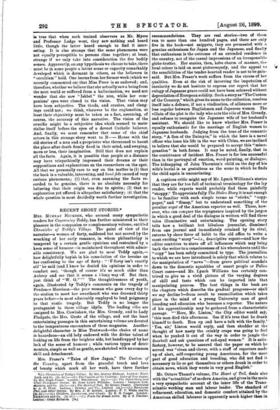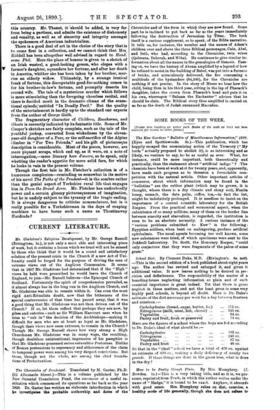RECENT SHORT . STORIES.* Mas. MURRAY HICKSON, who secured many sympathetic
readers for Concerning Teddy, has further ministered to their pleasure in the companion or complementary volume, entitled Chronicles of Teddy's Village. The point of view of the narrator—a woman of forty, saddened but not soured by the wrecking of her early romance, in whom philanthrOpy is tempered by a certain gentle cynicism and restrained by a keen sense of humour—is maintained throughout with admir- able consistency. We are glad to meet Teddy again,— how delightfully boyish in his consolation of the heroine on her confessing to the age of forty " ' F-forty isn't exactly old' he said (and I knew be denied his opinions in order to comfort me), ` though of course it's so much older than Aubrey and me that it seems a I-long, way off. But then, just think of " W. G." ' " The thoughtlessness of youth, again, illustrated by Teddy's comments on the tragedy of Prudence Morrison—the poor woman who goes every day to the station to meet her sweetheart who was drowned thirty years before—is most admirably employed to lend poignancy to that rustic tragedy. But Teddy is no longer the protagonist in these village idylls. The leading roles are assigned to Mrs. Cowliahaw, the Mrs. Grundy, and to Lady Fladgate, the Mrs. Grote of the village, and not the least entertaining passages in this entertaining volume are devoted to the tempestuous encounters of these magnates. Another delightful character is Miss Trotwood—the choice of name is hazardous—an old lady endowed with the divine talent of looking on life from the brighter aide, but handicapped by her lack of the sense of humour ; while various types of detri- mentals, simple as well as gentle, are sketched with no common skill and detachment.
Mrs. Fraser's "Tales of New Japan," The Custom of the Country, apart from the graceful touch and love of beauty which mark all her work, have three further • (I.) Chronicles of Teddy's Village. By Mrs. Murray Hickson. London : Ward, Lock, and Co. [3s. 6al.]—(20 The Custom of the Country : Tales of New Japan.
Mrs. Hugh Fraser. London : HutchInbon. ins.)—(3.) The Stolen Story, and Other Newspaper Stories. By Jesse Lynch Williams. London : Sampson Low, Marston, and Co. [5s.]—(4.) The Heart of Toil. By Octave Thanet. Illustrated by A. B. Frost. London : Downey and Co., Limited. [5s.]—(5.) Handsome Phil, and Other Stories. By Mrs. .1. H Riddell, . London : F. V. White and Co. [h. 6d.]—(6.) Children, Racehorses, and Ghosts. By E. H. Cooper. London : Duckworth and Co. [3s. 6d.]--(7.) From the Broad Acres. By J. S. Fletcher. London : Grant Richards. [Is.]
recommendations. They are real stories—two of - them run to more than one hundred pages, and there are only five in the book—not snippets, they are permeated with a genuine enthusiasm for Japan and the Japanese, and -finally that enthusiasm is the outcome of an extended residence in the country, not of the casual impressions of an irresponsible globe-trotter. Her stories, then, ha've charm of manner, the local colour is laid on most picturesquely, and the appeal to the sensibilities of the tender-hearted reader is not to be gain-
said. But Mrs. Fraser's work suffers from the excess of her qualities. Even at the risk of incurring the imputation of insularity we do not hesitate to express our regret that her eulogy of Japanese grace could not have been achieved without depreciation of European solidity. Such a story as "The Custom of the Country," which gives its name to the collection, resolves itself into a defence, if not a vindication, of alliances more or less regular between Englishmen and Japanese women. The villain of the plot is the lady who acts the rule of Mrs. Grundy, and refuses to recognise the Japanese wife of her husband's assistant. We should like to know whether Mrs. Fraser is equally enthusiastic for the marriage of English women to Japanese husbands. Judging from the tone of the romantic story, "A Son of the Daimyes," in which the hero is a naval officer who loses his life in the war with China, we are inclined to believe that she would be prepared to accept this "misce- genation" in both forms. It may be noted, finally, that in the contrivance of incident Mrs. Fraser is far less successful than in the portrayal of emotion, word-painting, or dialogue. The kidnapping of John Thornton's child on the day of his wife's burial is as gratuitous as the scene in which he finds the child again is unconvincing.
A captions critic might say of Mr. Lynch Williams's stories that they are far too full of technical terminology for the lay reader, while experts would probably find them painfully "shoppy." To appreciate fully The Stolen Story it is not enough to be familiar with such simple terms as "sticks," " copy. paper," and "flimsy," but to understand something of the peculiar argot of the American reporter as well. Those, how- ever, who can conquer the repugnance inspired by the jargon in which a good deal of the dialogue is written will find these tales illuminative and entertaining. The opening story tells how a brilliant but bibulous journalist, dismissed from one journal and immediately retained by its rival, returns by sheer force of habit to the old office to write a most exciting "story"—i.e., descriptive report—and how the editor contrives to stave off all influences which may bring back the writer to a consciousness of his whereabouts until the " copy " has been safely committed to type. The journalism to which we are here introduced is solely that which relates to the manipulation of "news "—from grave political scandals down to the domestic squabbles of smart people or Police Court cases—and Mr. Lynch Williams has certainly con- trived to give us a vivid picture of the varying degrees of skill and taste which can be imported into that manipulating process. The best things in the book are the chapters which describe the gradual progress—or shall we say decline ?—from revolt to reconciliation which takes place in the mind of a young University man of good breeding and education who becomes a reporter. The nature of his apprenticeship may be gathered from a characteristic passage. " Here, Mr. Linton,' the City editor would say, this man died this afternoon. See if it's true that he drank himself to death. Run np and have a talk with the family.' ' Yee, sir,' Linton would reply, and then shudder- at the thought of how nasty the crinkly crape was going to feel when he yanked it out of the way in order to jangle the doorbell and ask questions of red-eyed women." It is satis- factory, however, to be assured that the paper on which he served was "clean and 'clever, with a staff of reporters made up of alert, self-respecting young Americans, for the most part of good education and breeding, who did not find it necessary to lie or get themselves or others drank in order to obtain news, which they wrote in very good English."
Mr. Octave Thanet's volume, The Heart of Toil, deals also with the "actualities" of modern America, and gives in the main a very sympathetic account of the inner life of the Trans- atlantic working man and labour leader. The standard of refinement, education, and domestic comfort attained by the American skilled labourer is apparently much higher than in this country. Mr. Thant, it' should be added, is very far from being a partisan, and admits the existence of dishonesty and venality, as well as of sincerity and integrity amongst the spokesmen of American industrialism.
There is a good deal of art in the choice of the story that is to come first in a collection, and we cannot think that Mrs. Riddell has been altogether well advised in regard to Hand.. some Phil. Here the place of honour is given to a sketch of an Irish wastrel, a good-looking groom, who elopes with a farmer's daughter, squanders her fortune, and after her death in America, whither she has been taken by her brother, mar- ries an elderly widow. Ultimately, by a strange ironical freak of fortune, this disreputable good-for-nothing comes in for his brother-in-law's fortune, and promptly deserts his second wife. The tale of a mysterious murder which follows is more stimulating than the foregoing cheerless recital, and there is decided merit in the dramatic climax of the sensa- tional episode; entitled "In Deadly Peril." But the quality of the entertainment is hardly up to the standard one expects from the author of George Geith.
The fragmentary character of Children, Racehorses, and Ghosts is correctly indicated by its fantastic title. Some of Mr. Cooper's sketches are fairly complete, such as the tale of the youthful jockey, converted from wickedness by the eleven. year-old daughter of a Peer, or the self-sacrifice of the Alpine climber in " For Two Friends," and his gift of picturesque description is considerable. Most of the pieces, however, are mere piquant scraps, which end up, as it were, on a note of interrogation,—mere literary hors d'ceuvre, so to speak, only whetting the reader's appetite for more solid fare, for which he looks in vain in the present volume.
Though the first tale in Mr. Fletcher's collection is of a humorous complexion—reminding us somewhat in its motive of his novel The Paths of the Prudent—it is the sombre rather than the genial aspect of Yorkshire rural life that engages him in From the Broad Acres. Mr. Fletcher has undoubtedly power and a certain gloomy picturesqueness of imagination, but he is unduly subject to the tyranny of the tragic ending. It is always dangerous to criticise nomenclature, but is it really possible for a Yorkshireman in the days of reaping machines to have borne such a name as Thustinaway Hardrade P



































 Previous page
Previous page